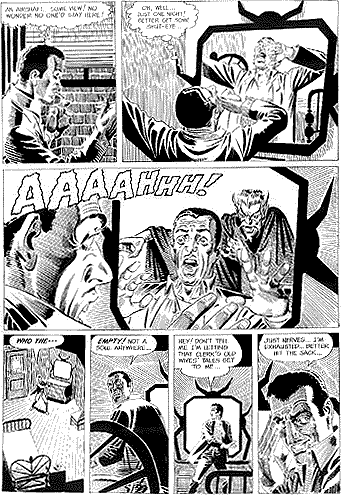 WARREN WORK
WARREN WORK
The July '66 cover date marked the final month
Ditko would spend on Amazing Spider-Man and Dr. Strange for Marvel.
May and June of the same year would mark Ditko's debut as an artist for Warren's
black-and-white magazines, Creepy and Eerie. Here Ditko would produce
some of the finest, most detailed work he has contributed to comics. The page to your left is
a scan of an original art page from Creepy #6. Below is a review of.....
''CREEPY #14''
Review by Blake Bell for DITKO LOOKED UP Mar '98.
Have you ever NOT been ready for a comic, or a style of writing
or drawing? Have you ever looked at a book, buried it and five
years later picked it up again and fully understood what the artist/
writer was trying to convey; lacking in understanding as to how you
missed it in the first place?
I purchased the bulk of my Ditko CREEPY/EERIE'S five years ago
and, for some reason, they didn't make much of a dent. I can say
the same for THE HAWK AND THE DOVE, and especially MR. A.. I
CERTAINLY wasn't ready for Mr. A. and all those dang words! Now I
find his objectivist writings, his uncompromising moral stances
invigorating as the '90s continue to disintegrate around us, while
few seem bothered.
It's been a long time since I tasted an issue of CREEPY or
EERIE, so tonight I popped CREEPY #14 in my mouth and sucked
it dry!
"Where Sorcery Lives" was the Ditko 8-pager and you can clearly
see the truth behind the story that the artists considered it a
privledge working for Warren and gave something extra.
The script probably isn't any different than most of the others
in the run, but Ditko's wash is superb! He really had a handle on
this technique. The third panel on page one, the knees-up close-up
of the story's hero, Garth (?!), sees Ditko stretching his art-work
to portray the muscle-bounded sword-carrier. It is Ditko, yet he
managed to combined his well-known style with what the character
required; a rare feat for an artist so stylized like Ditko.
The highlight on the issue has to be Page 2 of the story. The
detail Ditko puts into the villian's face (and that's all there is -
a big face and a Ditko hand) is exquisite. We are talking April '67
here, but fast-forward to 1983 and observe Jon J. Muth's excellent
"The Mythology Of An Abandoned City" from (you guessed it) Archie
Goodwin's Epic Illustrated. One is reminded of the face/mask from
Chapter One in both's sculpted beauty. It is a shame that Mr. Goodwin
is no longer with us to honor him for producing both works (I
suppose the work does him honor enough).
The rest of Page 2 is a marvel of structural technique. Compared
to the fine Dan Adkins story later in the book (where a man is dragged
to another dimension), one can see that Ditko was simply the finest
designer of alternate-reality comics ever known. From Dr. Strange
on down to Shade, where most artists would see reality and base another
world on it, Ditko dreamed of other worlds that would forge their own
fabric of reality.
What stands out in this story, as does in most Ditko stories, is
his ability to compact two pages into two panels. Ditko's five-page
stories leave you feeling like you have been satisfied by a whole
book, yet the essence of time is lost as you can't believe it only
took oneself mere minutes to pour over what seemed like an epic novel.
And that is the best way to read a Ditko story, isn't it? To simply
POUR yourself over it.
If you have any stories or articles concerning
Ditko's Warren work, please E-MAIL me.
You will receive full credit for your contributions.
